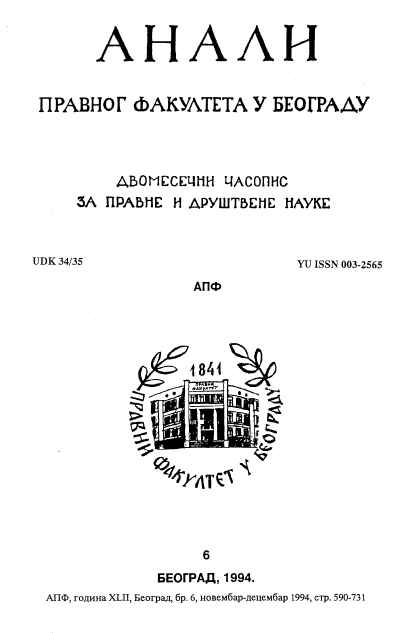ДИСКРЕЦИОНА ОЦЕНА КАО КРИТЕРИЈУМ РАЗГРАНИЧЕЊА НАЧЕЛА ЛЕГАЛИТЕТА И ОПОРТУНИТЕТА КРИВИЧНОГ ГОЊЕЊА
DISCRETIONARУ EVALUATION AS A CRITERION OF DELIMITING THE PRINCIPLES OF LEGALITУ AND OPPORTUNITУ OF CRIMINAL PROSECUTION
Author(s): Snežana CiglerSubject(s): Law, Constitution, Jurisprudence
Published by: Правни факултет Универзитета у Београду
Keywords: Legality; Opportunity; Discretionary evaluation; Free assessment of evidence; Interpretation of law
Summary/Abstract: In contrast to the general opinion according to which the notions pair - legality and opportuneness is reduced to the difference between the duty and the right of criminal prosecution, the author emphasizes in the present article that both principles establish the obligation as to criminal prosecution. The only difference is found in the final results, namely: in case of legality it comes up automatically, while, after statutory requirements have been mert, the statute becomes its direct source; in case of opportuneness there is a need of preliminary evaluation of suitability, so that it is a result of the activity fo the state agency. The difference at issue may be best expressed by using the notion of discretionary evaluation, which makes, in fact, the essence of the principle of opportuneness. The author considers also the subject matter, way, subject and limits fo discretionary' decision-making, so that such kind of deciding does not appear as an undemocratic institution which would eventually be held down in future development of law in this field. In such a way the present article should contribute to demystification of mentioned principle, which has quite often been heavily criticized in theory. Discretionary evaluation may serve as a deciding criterion of delimiting the principles of legality and opportunenes only in its purified form and separated from other cases of less intensive legal connectedness. A reasonably viewed relation: discretionary' evaluation - free assessment of evidence - interpretation of law, makes possible the identification of those zones of more liberal movements inherent in the function of public prosecutor which make more relative the principle of legality, while making it closer, in its effects, to the principle of opportuneness. In such a way the possibility of misuse of both principles would be diminished.
Journal: Анали Правног факултета у Београду
- Issue Year: 42/1994
- Issue No: 6
- Page Range: 635-652
- Page Count: 18
- Language: Serbian

